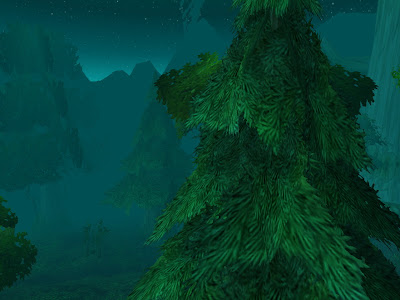
Though rich with life, the tunnels of Timbermaw only hint at the verdant purity stretching across the valley to the north. From my vantage point on the mountainside I could see the primeval forest, untouched since time immemorial.
“It was here that Cenarius’ hooves first tread upon the earth. Whatever he touched bloomed with life, and the once-silent valley rang with his great laughter,” said Amnelus. “No matter how many times I come to Moonglade, I am always struck by its beauty.”
“It is quite lovely. Nighthaven is here, correct?”
“Even in death you think only of your cities,” he sighed. “Yes, it is on the northern side of the valley. We should arrive there in a few days.”
A gently illuminated mist covered the ground of Moonglade, reminiscent of the moonwells’ glowing waters. I asked Amnelus about the mist.
“This mist is the breath of Lake Elune’ara. Elune’ara is a holy lake, and some of the texts say it is the first thing that Elune created. All druids know that Cenarius the Undying was swimming in the lake when he first heard Her glorious voice in the stars above.”
“Lake Elune’ara is like a giant moonwell then?”
“No. It is mostly water, but there is much of the soul energy within its depths. From Elune’ara comes the strength that nurtures all life within this valley. The demons who dared to tread here suffered agony with each step.”
Moonglade is almost like Felwood in reverse, a blessing for the uncorrupted peoples of Azeroth. A powerful tranquility is tangible in the sacred land. The cares of our world vanish when compared against the calm power of the natural world. Nations, cities, and even races may fall, yet nature will outlast them. Eternity itself is writ in the great trees and meandering streams.
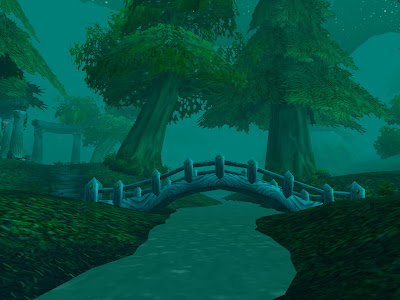
We frequently came across other elves on the narrow roads. Even in Moonglade, only a tiny percentage of the population are actual druids. Most of the inhabitants are simple artisans and harvesters working in that peaceable kingdom.
The elves of Moonglade dress quite differently from the Kaldorei in other parts of the world, choosing to wear living clothes of moss, leaves, and petals. The eyes in their aloof faces look past this world and into another.
“The barrow dens of the druids are more extensive here than elsewhere. While they slept in the Emerald Dream, visions of that wild perfection seeped into the minds of the normal Kaldorei in Nighthaven,” explained Amnelus, when I asked him about the Moonglade elves’ unusual mannerisms.
“They entered the Emerald Dream?”
“No Kaldorei with any wisdom would enter the Emerald Dream unless she were specifically invited. These were merely glimpses, nothing more. As its glory entered the dreams of Nighthaven, it inspired the people to make this world more like the Emerald Dream. When we druids woke from our slumber we found Moonglade more lovely than we left it. Truly, Elune is generous.”
Spectral lights shone through the morning mist when we arrived in Nighthaven two days after leaving Timbermaw Hold. The wall of gentle fog fell away, revealing wooden houses grown on lush islands on the surface of Lake Elune’ara. Graceful and airy bridges connect the different structures on that floating city. I saw only a few elves. Appearances are deceiving however, as Nighthaven is the most populous elven city next to Darnassus. Elves are far from the only inhabitants, as tauren and small groups of other races also dwell in Nighthaven.
Amnelus excused himself to report to the Lodge of the Claw, the headquarters for his order. Each druid order has a lodge in Nighthaven. The druids of the Claw, Talon, Antler, and Wild are the dominant orders. Smaller, more esoteric orders also exist, such as the druids of the Fang, Fin, and Root. Several druidic orders became defunct over the millennia, though their lodges are still maintained in case they ever return. Many of the fallen orders are race-specific, such as the Order of the Tusk (quillboar), Horn (tauren), Hoof (centaur), and Paw (furbolg). The Order of the Horn is the only one likely to be revived, though at the moment the tauren druids are content to join the existing orders.
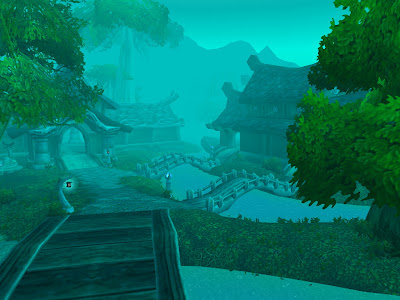
I quickly discovered that most elves in Nighthaven only speak Darnassian. If they know a second language, it is usually either Ursine or Taurahe, neither of which I understood. The tauren who live in Nighthaven do not usually speak Orcish, much to my surprise. A young tauren woman named Sanada Thunderspring explained the reason for this.
“Not all tauren are so fond of orcs. While Cairne Bloodhoof and most of the tribal chieftains embrace the orcs as their kin, others are less sure.”
“What is the reason for this distrust?”
“The orcs are sometimes a very savage people. The tribes have no quarrel with the night elves; our peoples were once friends. I for one, believe that the Warsong Lumber Camp should be abandoned and the forest restored.”
“Don’t the orcs have need for lumber?”
“They trespassed on the lands of the Kaldorei. When Thrall first came, it had been a long time since any tauren had laid eyes on a night elf. We thought of the Kaldorei as legends, the strange and terrible guardian spirits of the forest. Many of the shamans were alarmed when they heard that Grom was going north to harvest lumber, though they acted too late to stop him.”
“I suppose the orcs would say that they can’t afford to give up something for which they paid in blood,” I pointed out.
“The orcs are but visitors to this land. They must learn to respect its ways. The tauren remember the legends of ancient days, when tauren brave and elven archer fought together against the Burning Ones. The night elves are not our enemy. The druids of our people realize this, and that is why some here shun the use of the Orcish language, at least as long as the Warsong continue their operations. I think they perhaps go too far, though I understand their sentiment.”
I rather doubted that statement would make much sense to one of the orcs ambushed by the sentinels during Grom’s expedition. Sanada’s information did reveal much about tauren concerns. For all the closeness between the orcs and tauren, the United Tauren Tribes are understandably worried about the orcs’ bloody past.
Not long earlier, the Horde grappled over the orcish tolerance of warlocks. The tauren thought it supremely hypocritical and blasphemous to allow any sort of infernal magic, especially when the orcs were supposedly trying so hard to distance themselves from their cruel past. I remembered hearing about it in the catacombs of Undercity, where warlocks work freely. The entry of the Forsaken into the Horde pushed the warlock controversy out of the Horde’s attention. It has not yet returned.
The world is ever full of surprises. I had not long been in Nighthaven when I heard a hoarse, hollow voice calling my name.
“Destron! Is that you? It is, isn’t it! Destron Allicant!”
It was said in Gutterspeak. I turned to see a ragged, wraithlike figure limp towards me, a Forsaken woman wearing a white porcelain mask with painted red lips upturned in a quiet smile. Masks had grown popular among the Forsaken during my travels in the south, and I had seen a fair number wearing them in my last trip to Undercity.
“Yes, this is Destron.”
“Do you remember Anlivia Reterion? That’s me! I studied in Dalaran too! I suppose you would not be able to recall me with my new face, though if I took it off I’d probably become even less recognizable; time has not been kind to this beauty.”
Anlivia had been a fellow student in Dalaran. While not part of my circle of friends, I was vaguely acquainted with her. She was the daughter of minor nobility in Lordaeron, lost in a perpetual adolescent gloom. As an undead, she was peculiarly vivacious.
“Yes! I do recall! I’m glad to see you again. I haven’t met many of our class since the Plague.”
“Nor I, most probably march with the Scourge. What are you doing all the way in Nighthaven? You never struck me as being the adventurous sort.”
“Certainly not while I was alive. I’ve become braver since my resurrection. Undeath does have advantages, I suppose. I am here simply to learn. Yourself?”
“I came here to tell the Cenarion Circle how awful it is in Lordaeron, with the forests turning into immense graveyards. I long to see the land healed. If the green woods and meadows of Lordaeron return, there may be help for us.”
“I see. Are there many Forsaken who share this view?”
“No, we are quite few, I regret to say. We have the ear of Archdruid Remulos however, and Archdruid Runetotem in Thunder Bluff also heeds us.”
“And Staghelm?”
“Him? I’ll gut him myself if he comes down here! No one in Nighthaven likes him at all; Teldrassil’s nearly a curse word, and for good reason I think. Staghelm and his lackeys make a new world tree that starts falling to pieces the moment it springs from the seed, while Lordaeron rots! Disgusting, I think, don’t you?”
“Misplaced priorities perhaps.”
“Ah, Destron, ever so tactful. I always thought you rather handsome, back when clean blood flowed through both our veins.”
“Thank you.”
“I was too lost in my own illusory miseries. But now I have purpose, to see nature’s grace bloom across the Plaguelands. There’s nothing, I think, that could better hurt the Lich King.”
“How do the elves here react to you?”
“More with pity than hatred. The beauty of nature, life, and the senses mean so much to them that undeath seems the worst of all possible fates. They are not very talkative, even when you do know Darnassian.”
“You’ve learned it?” I asked.
“Enough to get around. All the elves here are so quiet, like grand and transcendent ghosts. The Cenarion Circle really has more power here than does High Priestess Tyrande or the Alliance. That’s why we can come in freely. If the Horde and Alliance ever want to make peace, this would be the ideal place to do it. Can’t you feel the calm in the air? This is nature at its finest, sure to outlast the nations of the world.”
“We are immortal, in a sense,” I pointed out.
“Ah, but on a long enough timeline everyone dies,” she said. She held up a skinless hand to adjust her mask, and I saw a glimpse of the rottenness beneath.
*********
I arrived in Nighthaven a few days before the Festival of Nature’s Song, a Kaldorei holiday that reveres the constant renewal of the natural world. Fittingly for the night elves, the height of the celebration does not occur until moonrise. During the day, I saw little to indicate that the city anticipated an important celebration. The bridges and waterways of Nighthaven were as quiet as ever.
While a beautiful place, Nighthaven does have an eerie quality that I found unnerving. It is almost the opposite of the eastern concept of a city. Perhaps this is because Nighthaven was founded primarily as a home for the druids. It could be seen as similar to one of the church towns of the Eastern Kingdoms, like Northshire or Hearthglen. But the holy settlements in the east eventually grew to encompass all the varieties of commercial and secular life. Nighthaven, on the other hand, has scarcely changed since its founding.
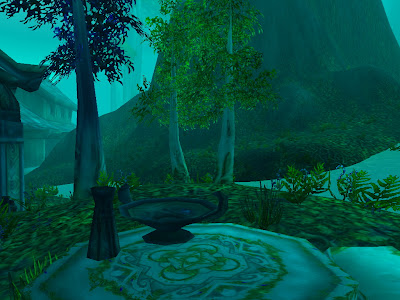
The Kaldorei in Nighthaven are detached, even by the standards of their race. Their focus on the eternal aspects of nature creates a strong mystic sensibility.
“Seeing the elves of Nighthaven, I must wonder if we in Darnassus can still be considered the same race as them,” said Lystrillia Shadowbreeze, a huntress who had been born in Ashenvale over 600 years ago. She first came to Moonglade sixteen years previous, mostly on a whim. Tales of demonic atrocity, especially in Felwood, intimidated her into staying.
“Do you feel at home here?”
“No, and I doubt I ever shall. The Kaldorei here are not cruel. They are very well-mannered, in fact. A while ago I spoke to a druid who was born and reared on Stonetalon Peak. He said that the elves here live in a perpetual waking dream. As such, they make other elves feel like humans. Which is to say, they make us feel ephemeral and unimportant. I’m not sure why, as we love nature’s glory as much as they.”
Upon learning I was a scholar, Lystrillia suggested that I speak with the druid she mentioned. Though relatively young, he was one of the historians of the Cenarion Circle and possessed extensive knowledge about his esteemed organization. His name was Elydus Summerleaf.
In the morning, Elydus had to meet with his brethren in the Lodge of the Talon. Non-druids are not permitted go inside any of the lodges, and only the druids of the appropriate order are allowed to enter a lodge’s inner sanctum. I waited outside in the morning mist until Elydus returned. I introduced myself to him, and he smiled when I told him Lystrillia had sent me.
“She is a good friend of mine. We’re going to meet on the shores of Lake Elune’ara in a week or two.” The Kaldorei tended to have a very loose definition of time, doubtless stemming from their longevity.
“What is the purpose of a lodge?”
“They are places for druids of an order to meet and discuss the issues of the world. Lodges are where the records of an order are stored. As a matter of fact, I maintain the records for the Order of the Talon.”
Elydus suddenly stumbled, and grabbed on to a rail to keep from falling. He gave a hearty laugh.
“Ah, it’s been a few years since I was wakened from the Emerald Dream, yet these feet still seem cumbersome. Walking is a poor substitute for flying.”
“You can still fly in the real world as well, correct?”
“Real world? What makes you so certain this is the real one? Ha ha, yes, all Druids of the Talon can change into the form of a stormcrow. Still, we are obliged to spend a certain amount of time in our elven bodies.”
I got around to asking him about the Cenarion Circle.
“When was the Circle first founded?”
“The Cenarion Circle has existed, in one form or another, since before the Sundering. When Queen Azshara ruled, the Circle was a marginal and rather disreputable organization. The elves of the time, you see, adored magic above all else. They regarded as lunatics those who chose to disdain magic.”
“How things change.”
“Indeed. Many Kaldorei have a hard time dealing with change, which is why it is important for us to interact with humans. So, the Cenarion Circle devoted itself to nature. After the War of the Ancients, we turned our attentions to cleansing the world of any leftover demonic or arcane corruption. We were under the control of Archdruid Malfurion Stormrage at the time. It was not until the War of the Shifting Sands that we became a more distinct organization from the rest of the Kaldorei.”
“I have heard of this conflict. You fought an ancient race of insects far to the south, correct?”
“Yes, the Qiraji. At the start of the War of the Ancients, druids did relatively little fighting. By the time of the War of the Shifting Sands, circumstances forced us to hone our combat skills. While we relied on the sentinels to do most of the fighting against satyrs and other rogue elements, we had to be prepared to do the same.”
“Then the druids fought the Qiraji?”
“Correct. Two events shaped the modern Cenarion Circle. The first was the Battle of Staghelm Point, far to the south. No one agrees on precisely what happened. The important thing is, the sentinels were too few to effectively protect the druids, and the qiraji slaughtered their wards. Ever since, we've taken great pains to train druids in the ways of battle. That is how the Order of the Claw, once a minor order, rose to become the most populous.”
“And the second?”
“That would be the Order of the Mandible. The Cenarion Circle at the time was loose-knit. While we had to answer to the Archdruids, most orders were allowed to go their own way. The Order of the Mandible was always a strange bunch. Their animal spirit was the insect. Druids believe in preserving nature; the Order of the Mandible wanted to change nature so that it would be better able to protect itself.”
“In what way?”
“They believed that the forests were too fragile and vulnerable to be last against the Burning Legion, were the demons to return. They pondered this problem for centuries until they decided they found an answer in the Qiraji. The Qiraji ruled a slave race of non-sapient insects called the silithids, and it was these silithids that so intrigued the Druids of the Mandible. They thought that silithids would be the perfect natural defense against the Burning Legion. Their ideal was a world of sand and rock, interrupted only by fleshy silithid hives. So long as nature survived in some form, they would consider their duty to the Ancients fulfilled.”
“They tried to side with the Qiraji?”
“They did. The Order of the Mandible switched sides without warning in the midst of a battle. We purged the order soon after. This disaster did force the Cenarion Circle to organize itself more rigidly. Unfortunate, but necessary. Archdruid Remulos wrote the Codex of the Ancients as a standard for all druids to follow.”
“Do any Druids of the Mandible still exist?”
“I’m sure some do. Every now and then someone reports seeing a Druid of the Mandible living in one of the dark corners of Kalimdor, babbling to insects. Theirs was the only lodge to be destroyed, though some druids claim to see it in dreams.”
“The Emerald Dream?”
“No, Ysera would never permit it to exist there. Someplace between the Dream and the normal world. No one can give a very clear description of the Lodge of the Mandible, save that it is full of dark shadows and red walls. Truthfully, I think they are only dreaming it.”
“Going back to the first subject, is the Cenarion Circle a completely separate entity from Darnassus?”
“You must remember that Nighthaven was the capital of our people long before there ever was a Darnassus. The Codex of the Ancients became the final word in our decisions; the work of High Priestess Tyrande never interfered with it, so things went well. The problem was the Codex said nothing of what to do if Nordrassil died. We did not even imagine such a thing possible.”
“Can the Codex be changed?”
“It can. But that fool Staghelm went ahead with Teldrassil, figuring that if the Codex was silent on the matter, anything was permissable.”
“Some druids followed Staghelm.”
“Yes. The druids who serve him in Darnassus and elsewhere are still ostensibly part of the Cenarion Circle. Unfortunately, Nighthaven is too inward looking. It is a common trait for the Kaldorei, and it is worst here. For better or worse, Staghelm’s faction is the face of the druid orders for the nations of the Alliance.”
Controversy endlessly dogs Staghelm. In all fairness, he found himself put in the very unenviable position of succeeding the popular Malfurion. Yet his actions alienated many night elves, as I had already witnessed on my travels. Archdruid Remulos is a similarly divisive figure, revered by the old guard but regarded as a buffoon by druids in Darnassus and Teldrassil.
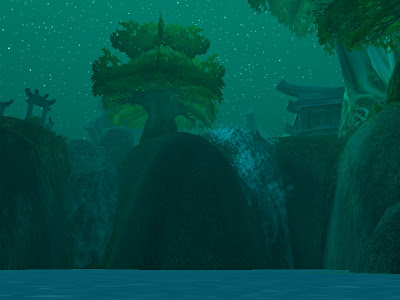
Archdruid Remulos presided over the ceremonies of the Festival of Nature’s Song, later that night. Remulos is of that rare breed known as the Keepers of the Grove, essentially the male equivalent of a dryad. They are primal-looking creatures, with great antlers growing from their heads, and right hands that resemble gnarled wooden claws.
The multitudes of Nighthaven gathered by the waterways of the ancient town, the darkness of night lit up by glowing lampposts shaped like flowers. Leaves had been carefully placed on the current, bearing purple candles that shone brightly in the sacred dark. A hush fell over the crowd as Remulos approached, flanked on each side by four druids. Remulos is the eldest son of Cenarius the Undying, most revered of all the Ancients. As such, Remulos is nearly a demigod in his own right.
I could see why some thought the Archdruid intimidating. With his long, tangled green beard (festooned with boldly colored flowers) and burning eyes he looks like one of the cruel and fickle gods of the ancient Arathi pantheon, perhaps Grulnir the Green. He spoke, his voice echoing like thunder in the valley, and he raised his massive arms to the sky.
Remulos spoke in Darnassian, in a voice stern yet also reverent. I found out later that he had been giving an ode to nature’s might. Occasionally he paused, and the night elves would respond en masse as confirmation.
At around midnight, I heard massive drums being banged in a slow and measured tempo, like a heartbeat. Piercing woodwinds raised their voices to nature’s power. As if on signal, the elves cast seeds into the water.
Then, something wondrous happened. The seeds opened the moment they hit the surface, spilling forth vines and flowers that all shone with a hallucinogenic inner light. In less than a minute, barges of living flora floated their way down the canals to Lake Elune’ara. A few large flowers opened up to release bright birds and rodents, who frolicked in their strange wilderness. Fireflies buzzed through the reeds, surrounding each mass with countless motes of light.
The elves gathered in a slow procession, walking towards Lake Elune’ara. Over time, the bits of floating forest gathered there until an impossible island thrived in the midst of the waters. As it coalesced, the elves lifted their voices in song. Theirs was a deep, rumbling chant, beautiful and ominous like the natural world that it praised. Wisps began to filter out from the forest and town, floating towards the new island. With them casting their light over the waters, it was as if a moon had suddenly appeared in the midst of Lake Elune’ara.
The air vibrated with song, the drums still audible over the thousands of elven voices. The waters of the lake churned and the assembled wisps grew brighter and brighter. Luminous rays emanated from beneath the surface, surrounding the island in a wall of soft light.
Then it vanished: the created forest, the wisps, and the light. The waters of the lake rested in perfect stillness. A quiet and joyous air, the feeling of a duty well-done, came to the elves. Wandering away in small groups they walked to the forests where they would commune with the voices of the trees and the stones.
*********
Not a single elf could be found in Nighthaven the next day. Many of the tauren were gone as well, though some stayed to watch over the city. I spent much of the day with Anlivia, who explained what had happened.
“That forested island they created was a gift to the Emerald Dream. They cultivate those special seeds all year and they are enchanted to create the most vibrant examples of flora and even fauna. These are pure enough to be sent to the Emerald Dream, and by doing so they renew the connection with that realm. I’d like to see the Emerald Dream one day, though I don’t ever expect it to happen. I have to say I think the druids are too preoccupied with it.”
“How so?”
“They long for it so much that they start to lose touch with the real world. Not all, or even most, but more than a few. When the Druids of the Claw were woken during the Third War they actually forgot that they used to be elves! Malfurion had to remind them that they weren’t bears.”
The elves began filtering back into Nighthaven the next day, though there were still much fewer present than normal. I was nearly ready to leave Moonglade, but I still wished to see the Stormrage Barrow Dens in the east. They are less than a day’s journey from Nighthaven.
For thousands of years, the barrow dens provided a safe place for the druids to hibernate. While their bodies reposed in dark caverns beneath the earth, their spirits wandered through the Emerald Dream. The enchantments of the den preserved and cared for the druids’ bodies.
The barrow dens themselves are well-made for their purpose. The problems that afflicted them came more from elven mismanagement. Most were left undefended, and often became infested with satyrs and other interlopers. Perhaps worse was the fact that no one really bothered to keep track of the different barrow dens. As such, the elves forgot about at least one barrow den all through the Third War. This was the one south of Splintertree Post that had been seized by the Forsaken soon after. The dens shielded the druids from outside interference; this worked well against the satyrs. Unfortunately, the Forsaken were determined to break through and had more resources than the forest's lawless demons. The Cenarion Circle now works to ensure that no den will again be overlooked, and have hired dwarven accountants to improve their operational efficiency.
The Stormrage Barrow Dens are the preferred hibernation place for many of the senior druids. This fact, and its proximity to Nighthaven, protect it from the troubles that plagued many of the other barrow dens. There are three dens in the complex, shaped into the hills surrounding the largest moonwell in the world. In ancient times, the well was a fountain of magical energy beloved by the Highborne. Druids cleansed all traces of the arcane after the War of the Ancients.
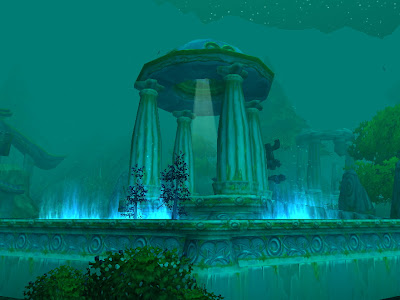
I figured I would not be allowed to go inside the barrow dens, but to my surprise outsiders are free to visit so long as a warden escorts them. The wardens are a type of elite night elf soldier that tracks down fugitives (usually satyrs) for arrest or execution. The first wardens were sentinels who specialized in killing or apprehending rogue sorcerers after the War of the Ancients; Illidan was their most famous quarry. They performed so well that they were made a separate organization. The druid orders prefer the wardens to the sentinels, whom they do not always regard as reliable. This stems from the sentinels' failure to protect the druids at the Battle of Staghelm Point.
The warden who guided me was a grim-looking woman named Elserna Windblade. She had only a limited ability to speak Common, and could do little to inform me about the dens. In silence she led me down the long, spiraling passage that burrowed into the earth.
The interior of the barrow den is warm and damp, the walls shaped by thick roots. The roots actually belong to the aboveground section of the den, which is alive like many night elf structures. Small lanterns provide a comforting light. The caverns themselves are quite confusing in layout, coiling into the earth without any seeming logic. The hibernation chambers are often set into high sections of wall, only accessible by winding wooden bridges.
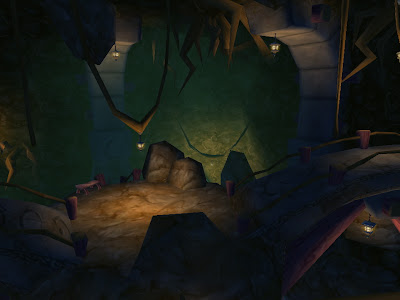 Something of the barrow den reminded me of the catacombs beneath Lordaeron, in which the church laid the bones of its early priests and theologians. I saw those twice; first as a child, when the exposed skeletons terrified me. The second time was in my adolescence, and the sight inspired only a vague melancholy. My reaction to the barrow den was similar. After interminable bridges and tunnels, I would come to a small, dusty chamber where a druid had slept for thousands of years. The barrow dens are maintained for a return to the Emerald Dream, but the druids’ duties are so many that it will be a long time before they can do so. The den was once a sacred place where the protectors of nature slept. When I went, it was barely remembered.
Something of the barrow den reminded me of the catacombs beneath Lordaeron, in which the church laid the bones of its early priests and theologians. I saw those twice; first as a child, when the exposed skeletons terrified me. The second time was in my adolescence, and the sight inspired only a vague melancholy. My reaction to the barrow den was similar. After interminable bridges and tunnels, I would come to a small, dusty chamber where a druid had slept for thousands of years. The barrow dens are maintained for a return to the Emerald Dream, but the druids’ duties are so many that it will be a long time before they can do so. The den was once a sacred place where the protectors of nature slept. When I went, it was barely remembered.
I know it's kind of late to be correcting, but wheren't the Wardens already created since the incarceration of Illidan?
ReplyDeleteYou're right, actually, the first Warden would go back at least to Illidan (which would predate the Order of the Mandible). Thanks.
ReplyDeleteRafinius, I went ahead and changed it, writing that the Wardens got their start after the War of the Ancients, hunting people like Illidan.
ReplyDeleteThanks again, and it's never too late for corrections :)
I absolutely adore this story and it has essentially become my head-canon for world of warcraft culture's and history's.
ReplyDeleteI am not sure if you still respond to question but i have to ask.
In this chapter the Tauren Druid said the Orcs are merely guests.
I'm curious though in what sense does she consider them guests.
They them selves see it rightfully or wrongly as their home and have built cities i doubt they'll just pick up one day and wonder off.
Is it just a cultural thing to do with the tauren nomadic life style or does she actually think the orcs are just camping on the barrens doorstep for a year or two before wondering off again?
Sorry if this is a double post
All posts appear in my email inbox, so I'm always around to answer questions!
ReplyDeleteThe tauren meant it in more in the sense that she sees Kalimdor as the place (not necessarily the property) of the tauren. The way she sees it, the tauren welcomed the orcs in, so in that sense the orcs are obliged to respect their hosts.
Ah, so he finally met one of his fellow wizard aprentices at long last.
ReplyDeleteYou're being really excellent with the atmosphere here, both the intriguing and melancholic parts.
The druids of the mandible are your invention right??? or there is some lore about it?
ReplyDeleteThe Order of the Mandible is my own invention.
Delete